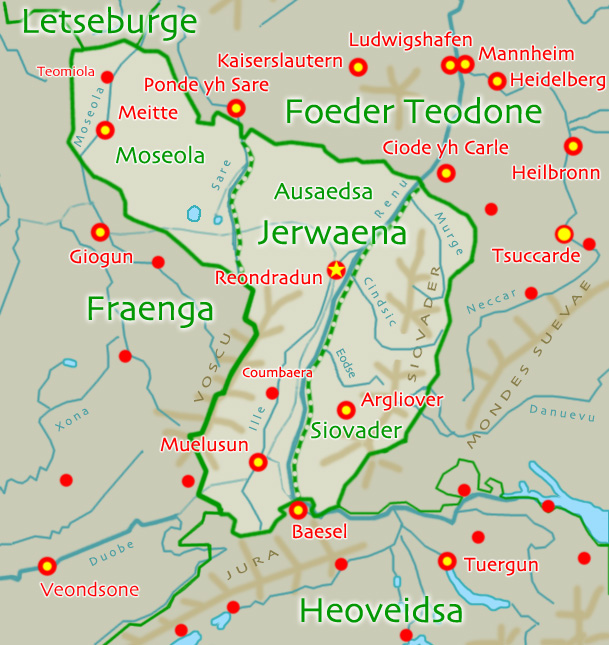Jervaine
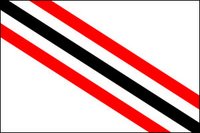
| |
| National motto: Pergatur Cultura | |
| Languages: | |
| Official: | Jovian, German, Francien |
| Others: | Helvetian, Luxemburgish |
| Cities: | |
| Capital: | Reondradun (Rendrade, Strasbourg) |
| Largest: | Reondradun |
| Other: | Argliover (Freiburg), Meitte (Metz), Muelusun (Mulhouse), Coumbaera (Colmar) |
| High King: | Vaendine II. |
| Prime Minister: | Susanna Ivauma |
| Area: | 19'415 km2 |
| Population: | 4.014 million |
| Independence: | from HRE |
| Declared: | 1949 |
| Recognized: | 1949 |
| Currency: | 1 Crona = 20 Soedi = 240 Pfeinges (EF) |
| Organizations: | Juzigun Eorobé jon Dricti Huwani (JEDH) |
The High Kingdom of Jervaine is a small proud nation in the heart of Europe, known for its wealth, diplomacy, hearty cuisine and fine wine. It comprises the three provinces Ausaedsa (Alsace), Siovadra (Black Forest) and Moseola (Moselle), the latter two of which enjoy a condominium status with the Holy Roman Empire and France, respectively.
Originally split off the crumbling Roman Empire, the kingdom has endured several Germanic mass migrations and has been passed to and fro between French and German empires. Nevertheless, its unique High Romance language known as Jovian gave the people a sense of unity and identity even when foreign flags flew on their castles.
Being land-locked, Jervaine never colonized other terrains, but through its large-scale business agreements with Batavian colonial shipping acquired significant amounts of real estate in Seilon (Ceylon), where the Soectade Audraele Té ed Cofé (SATEC, High-Royal Tea and Coffee Company) is based.
The picturesque villages, idyllic countrysides, snowy mountains and culinary delights make the High Kingdom a popular tourist destination.
Administration
Government
The High Kingdom of Jervaine is a federalistic constitutional monarchy. The national parliament is divided into a house of commons and a house of nobles. The bulk of political power lies in the former, whereas only the latter have the priviledge to elect the High King. The executive is a septumvirate elected by the two houses. The Audu Ric himself has more of a representative than a ruling role nowadays, but can wield considerable influence on public opinion given a charismatic personality.
Administrative Divisions
The federal levels of organizations below the High Kingdom are the provingae (provinces), pahi (districts) and logaeldades (townships). Each such entity has a parliament and an executive council. The nobility also appoints local leaders for each entity, with no appreciable political power.
Here is a quick overview of the three provinces of Jervaine.
| Province | Area [km2] | Pop. [103] | Cities (Pop.) |
| Ausaedsa (Alsace) | 8'332 | 1'747 | Reondradun (427), Muelusun (234) |
| Siovadra (Black Forest) | 4'867 | 1'224 | Argliover (210) |
| Moseola (Moselle) | 6'216 | 1'023 | Meitte (323) |
The Jovian-speaking minority in Ceylon is not officially a part of the High Kingdom, but often informally referred to as ja Coloenul, the Little Colony.
History
The earliest ancestor of the Jervan nation is the ancient Roman province Germania Superior, whence the name is derived. Already towards the end of the third century AD, the local Roman prefects began to feel less and less obliged to the waning Empire, and de facto ruled as kings. Three prefects in particular are noteworthy for their unhumble opinion that Germania Superior was the ark in which the culture and civilization of Rome was to be perpetuated as the Empire fell. They insisted that their courts speak proper Roman, i.e. Classical rather than Vulgar Latin, or as Prefect Rodericus II. famously put it, the language of Jove rather than of the cattle (lingua jovis nec bovis), hence the name Jovian. Many Classical features quickly trickled from the nobility down to the citizens and peasants.
During the Hundred Years War the High King of Jervaine allied with the French King against the Dukes of Burgundy, a threat to the western borders of Jervaine and the English King, quickly counterbalancing the Anglo-Burgundian alliance.
Geography
Borders
West: Voscu (Vosges) mountain range
East: Siovader (Black Forest) mountain range
Economy
Caesar described the land as optimus totius Galliae, and Louis XIV. exclaimed "Quel beau jardin!" upon acquiring it. The High Kingdom has been known as fertile and prosperous throughout history, and even nowadays, its gross social product per capita is only matched by spoilt city-states like Monaco. ;o)
The most well-known Jervan exports are fine wines, beer, educated professionals and the High-Royal Tea and Coffee Company, SATEC, whose products and overpriced but popular cafés can be found all around the globe. Similarly, the Niorul food corporation has its fingers in many a distant country, but is primarily known for the invention of instant coffee. The trademark Niocafé is often heard as a generic term for instant coffee.
Another of Jervaine's hallmark industries is the movie business. A respectable volume of motion pictures, both experimental and high-budget mainstream, is produced in the High Kingdom every year. The national broadcasting company, VoJo, and several movie studios are located in a suburb of Muelausun, Siovilge ("holly forest"), which has become synonymous with Jervan moviemaking.
Tourism is a lucrative business in Jervaine, too.
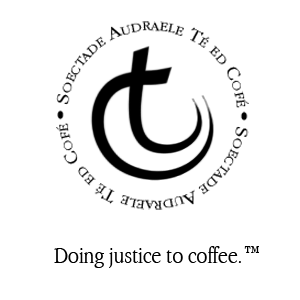 |
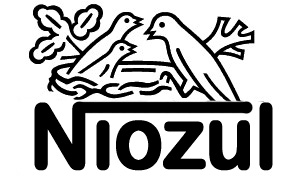
|
| Logo of the SATEC cafés. The slogan may vary. (I'm thinking of fitting a crown somewhere in that doodle...) | The omnipresent logo of the Niorul food corporation. (Disclaimer) |
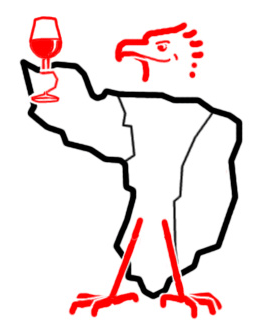
|
| The Aegel Jerwanu, official mascot of the Jervan tourism administration. Note the uncanny resemblance of the black outline to the geographical shape of the High Kingdom. |
Transportation
Jervaine features a close-knit system of public transportation using buses, ferries and the High-Royal Railway. Reondradun is reachable by high-speed train from Mannheim and Basel (ICE) and Paris (TGV). Reondradun is also home to the headquarters of Aumaetruc, S. A., a company which maintains industrial facilities constructing and developing railway improvements throughout Europe and the world.
The national airlines, the Alae Joevae or Jovian Wings, enjoy an image of high comfort and retro-style class... and correspondingly high fares, of course.
 |
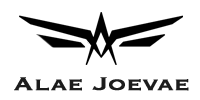
|
| Logo of the High-Royal Railway, Audraele Traenaerun. |
Logo of the High-Royal Airlines, Alae Joevae. |
Culture
Languages
"Nationis lingua sanguis eius", as the saying goes. The unifying heritage and pride of the Jervan people is their proper language, Jovian. German and Francien are strong second languages in Siovadra and Moseola, respectively.
Religions
I'll need to make up a Jervan reformer to translate the Bible into Jovian. I'd say some 40% each of the population are Catholic and Protestant, respectively, with maybe a 10% Humanist minority. Regardless of my own ties to Humanism, Strasbourg seems a fitting setting for an organized Humanist movement, human rights court and all. ;)
Cuisine
The enjoyment of food and drink is one of the most imporant aspects of the art de vivre in the High Kingdom, as is evidenced in the long list of internationally popular Jervan specialties. Typical dishes include cuehel lodranun (quiche lorraine), cuehul on miorvels (Mirabelle pie), cuehel flammadun (flammekueche), caulaecta (sauerkraut), and gaulu mou uenaeru (chicken in Riesling).
The Jervan vineyards bring forth world-class white wines such as Flingosa (Riesling), Muscadun (Muscatel) and Trawinun (Traminer), as well as some rosés and few reds, although these latter are infamous for their poor quality (especially compared to French, Aragonese, and Italian red wines, not to mention Jervan whites). Furthermore, several brands of beers are brewed and liquors distilled. Wine, beer and liquor feature are featured prominently in the ingredient lists of many local dishes and deserts. The traditional Roman meidun, diluted and honey-sweetened wine, and its more modern sibling sambuegun with elder-flower syrup, make refreshing summer drinks.
Finally, the High Kingdom entertains a rich coffee culture. A large variety of styles and sizes of the black gold is offered in any of the multitudinous cafés. Order an aubu if you like latte macchiato, carwel if you're into caramel, ambrettu for amaretto and blatse for a shot of pomace brandy.
The unique Jervan product BioCola falls into the fuzzy area between soft drinks, new age medicine and drug abuse.
Music & Dance
Among the many native and imported music styles heard in the High Kingdom, Argentine Tango deserves special mention. Partially due to the large Jervan immigrant community in Riu d'Archent which retained links to the homeland, dancing tango is such a popular and well-practiced hobby here that many Jervans believe the Argentines stole it from them. The most prevalent style is Orillero, whereas Milonguero is commonly regarded as limiting and unaesthetic, and formulaic by-the-book Parisian-style tango as the ultimate sin.
See also
Jovian language: http://www.cinga.ch/langmaking/jovian.htm
